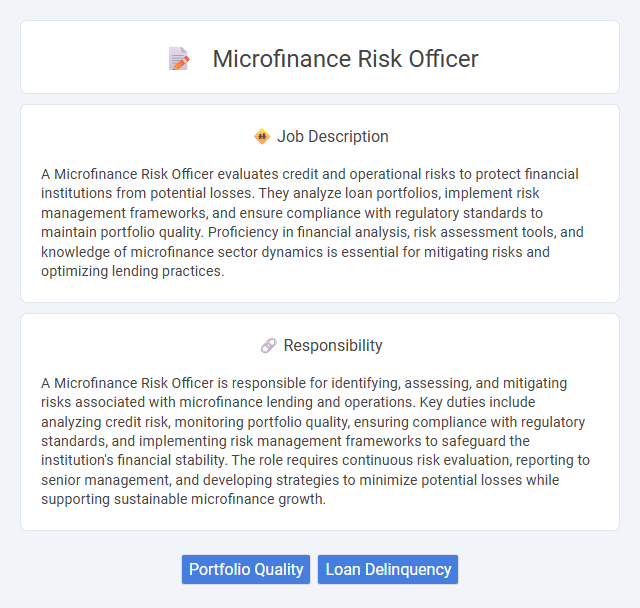
A Microfinance Risk Officer evaluates credit and operational risks to protect financial institutions from potential losses. They analyze loan portfolios, implement risk management frameworks, and ensure compliance with regulatory standards to maintain portfolio quality. Proficiency in financial analysis, risk assessment tools, and knowledge of microfinance sector dynamics is essential for mitigating risks and optimizing lending practices.
Individuals with strong analytical skills and a keen eye for detail are likely suitable for a Microfinance Risk Officer role, as the job involves assessing financial risks and client creditworthiness. Those comfortable working with vulnerable populations and understanding socio-economic conditions may better anticipate potential loan defaults and design mitigation strategies. Candidates who possess resilience and ethical judgment probably excel in maintaining the delicate balance between supporting clients and managing institutional risk.
Qualification
A Microfinance Risk Officer requires a bachelor's degree in finance, economics, or business administration, with strong analytical skills to assess credit, operational, and market risks effectively. Proficiency in risk management software, knowledge of microfinance regulations, and experience in data analysis are essential for accurate risk evaluation. Certifications such as CRM (Certified Risk Manager) or FRM (Financial Risk Manager) enhance the candidate's qualifications and professional credibility in this role.
Responsibility
A Microfinance Risk Officer is responsible for identifying, assessing, and mitigating risks associated with microfinance lending and operations. Key duties include analyzing credit risk, monitoring portfolio quality, ensuring compliance with regulatory standards, and implementing risk management frameworks to safeguard the institution's financial stability. The role requires continuous risk evaluation, reporting to senior management, and developing strategies to minimize potential losses while supporting sustainable microfinance growth.
Benefit
A Microfinance risk officer's role may significantly reduce financial losses by identifying and mitigating potential risks within microfinance institutions. Their work likely enhances portfolio quality and promotes sustainable lending practices, which can lead to increased profitability and institutional stability. Effective risk management in microfinance may also improve client trust and access to credit for underserved populations.
Challenge
Microfinance risk officers likely face the challenge of accurately assessing credit risk in environments with limited financial data and informal borrower profiles. They probably encounter difficulties in balancing risk mitigation with the need to provide accessible financial services to underserved populations. Managing operational risks such as fraud, regulatory compliance, and market volatility could also be significant aspects of their role.
Career Advancement
Microfinance risk officers play a critical role in identifying, assessing, and mitigating financial risks within microfinance institutions, ensuring portfolio health and regulatory compliance. Skill development in credit analysis, risk modeling, and data analytics enhances career prospects, leading to senior roles such as risk manager or chief risk officer. Expertise in emerging technologies and regulatory frameworks accelerates advancement opportunities in the dynamic microfinance sector.
Key Terms
Portfolio Quality
A Microfinance Risk Officer plays a critical role in maintaining portfolio quality by monitoring loan disbursements, repayment patterns, and client creditworthiness to minimize default risks. They analyze financial data and market trends to identify potential risks and implement strategies that safeguard assets and ensure regulatory compliance. Consistent portfolio quality assessment supports sustainable lending practices and enhances the institution's financial stability.
Loan Delinquency
A Microfinance Risk Officer analyzes loan portfolios to identify and mitigate risks associated with loan delinquency, ensuring timely repayments and minimizing default rates. They develop risk assessment models and monitor borrower creditworthiness using data analytics and socio-economic indicators. Effective risk management directly contributes to sustaining the institution's financial health and expanding access to microloans for underserved communities.
 kuljobs.com
kuljobs.com